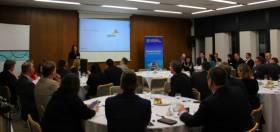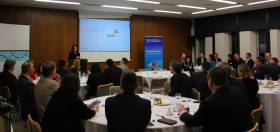Displaying items by tag: Ship Commerce Forum
Shipping Review: Eco-Trader's First Sea Trials, Inaugural Shipping Forum & First Also for Maersk
#ShippingReview – Jehan Ashmore reviews the shipping scene over the last fortnight.
Eco-Trader, Arklow View took her first sea trials for Arklow Shipping’s Dutch division when the cargsoship newbuild took to open waters off Eemshaven.
Another first took place back in Ireland, as the Irish Maritime Development Office (IMDO) hosted the Ship Commerce Forum, the event entitled ‘Maritime Finance: Opportunities for Ireland’.
Dublin Port Company’s opposition to plans for housing on Poolbeg peninsula, raised fundamental issues of whether this area is suitable for residential-led regeneration.
Another port with infrastructure plans, the Port of Cork is set to gain €30m from the European Investment Bank (EIB) to development the country's biggest natural harbour.
Quinn Cement to build new cement silos at Warrenpoint Harbour in a £2.5 million investment. The silos 7,500 tonnes capacity will be used to export the product.
Irish Continental Group (ICG) appoints David Ledwidge as a Director of the Company, having previously held position of Chief Financial Officer designate.
Maersk Group is to return to the Port of Liverpool through subsidiary Seago Line. In addition the line is make direct calls to Dublin Port, a first ever for the Maersk group on the Europe 'feeder-service' to North African and Mediterranean ports.
IMDO Host Inaugural Ship Commerce Forum
#Forum - The Irish Maritime Development Office (IMDO) hosted an inaugural meeting of the Ship Commerce Forum as the first industry event of 2016. The event was held on Thursday 18th of February at Wilton Park House in Dublin.
The event entitled ‘Maritime Finance: Opportunities for Ireland’ was well attended with a broad spectrum of representatives from professional services firms, financial institutions, international shipping companies as well as representatives from international asset leasing companies based in Ireland.
The round table event was created to initiate an industry focused debate on the current opportunities for Ireland in the maritime finance industry as well as the barriers that exist. Discussion also considered how Ireland could become a centre for maritime finance leveraging on the established leasing support services and expertise available here.
The IMDO Director, Liam Lacey, put forward some broad questions centred around Ireland’s potential as a maritime finance hub. He spoke at length about Ireland’s strength as a location for Foreign Direct Investment and success in other industries, whilst at the same time drawing attention to the opportunities inherent in Ireland’s current underperformance in the Maritime sector.
After a period of intra table debate and presenting back ideas Yvonne Thompson, Tax Partner at PwC gave a summation of the night’s discussion and highlighted some of Ireland’s strengths which make us an ideal location for companies involved in Maritime Commerce.
Growth and development of Ireland’s Maritime Commerce sector is an important initiative which ties into government ambitions outlined in Harnessing Our Ocean Wealth, the IMDO aims to create a forum through which industry views can be channelled and lessons learned.
The forthcoming Harnessing Our Ocean Wealth will take place in Galway on the 1st of July as part of the Marine Institute’s 3rd annual event SeaFest 2016.

























































